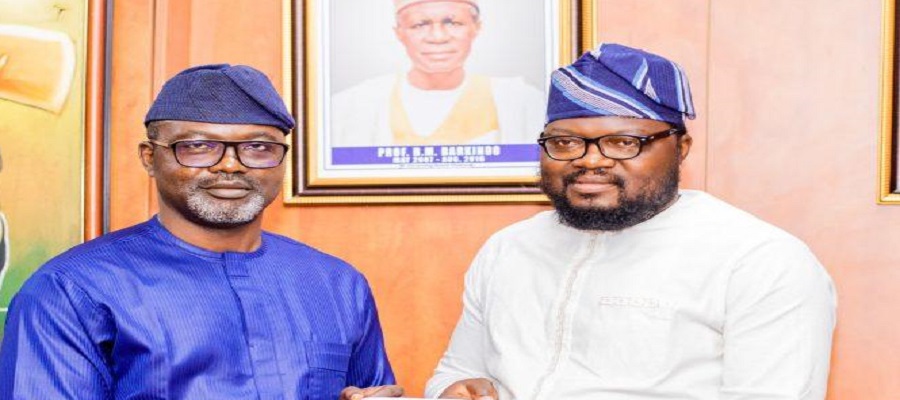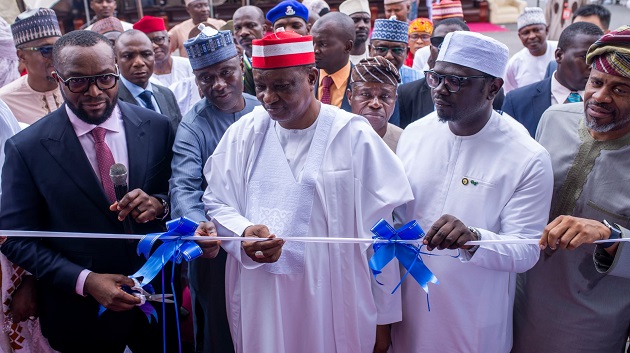News
NACCIMA Warns Against Arbitrary Taxation on Businesses

The Nigerian Association of Chambers of Commerce, Industry, Mines, and Agriculture has expressed concerns over the long-term implications of arbitrary taxation on businesses and the nation’s economy.

Dele Oye, President, NACCIMA, speaking at the 45th Trade Fair hosted by the Kano Chamber of Commerce, Industry, Mines, and Agriculture, emphasised that high taxes hinder innovation, stifle investment, and pose a threat to the sustainability of enterprises.
He said, “As Margaret Thatcher warned, we should be wary of high taxes. High taxation restricts the power of the people while giving more authority to the government.
As we strive for economic prosperity, I must also draw attention to the issue of arbitrary taxation. I urge all levels of government in Nigeria, especially state and local governments, to consider the long-term implications of high taxation on businesses.
“High tax burdens can stifle innovation, deter investment, and threaten enterprises critical to our economic growth. Let us work collaboratively to create a business-friendly environment that encourages entrepreneurship and fosters economic development.”
Meanwhile, called for a review of sections of the 2024 Tax Bill, citing provisions that negatively impact businesses, particularly those operating within free trade zones, and therefore urged the Federal Government to adopt a more collaborative and long-term approach to taxation policies so as not to destabilize critical sectors of the economy.
While speaking on free trade zones, Oye appealed to the President to consider advice from the genuine private sector and organised private sector in Nigeria, urging to always hold stakeholder forums before implementing major economic policies.
“In this regard, we appeal to reconsider and withdraw the approval of the memorandum dated October 20, 2024, authored by the FIRS Chairman. This memorandum inadvertently overlooked the legal basis for the incentives on free trade zones granted by President Obasanjo in 2002, predicated on Section 23(s) of the 2007 CITA.
“We urgently call upon the Federal Government of Nigeria to take the following actions: Expunge Sections 60, 198(2), and 198(3) from the bill; exclude free zone enterprises from the scope of Section 57 of the bill, and delete the current Second Schedule of the bill in its entirety, which was inserted into the tax bill 2024.”
Speaking on the theme of the event, “Non-Oil Export for Economic Prosperity,” the NACCIMA president said it resonated deeply with the collective aspiration for sustainable economic growth.
“The future of our economy undeniably lies in the diversification of our exports, and we must rally together towards this goal.
“The government must take deliberate and proactive steps to create market access for non-oil exports by implementing strategic policies and programs that connect local producers to global markets. Establishing trade offices in key export destinations can promote Nigerian products and facilitate business linkages.
“Through strategic partnerships with international trade organizations, we can secure preferential trade agreements that grant Nigerian products a competitive edge.
“Moreover, government-led initiatives like trade missions and export-focused road shows can showcase the quality and diversity of Nigerian goods while building networks with foreign buyers. By leveraging diplomatic channels, we can address barriers such as restrictive trade policies, unfair tariffs, and logistical challenges that hinder market penetration.”
He further added that the government could offer incentives for banks to lend more to export-oriented enterprises, fostering growth and enabling businesses to compete effectively in international markets.
He added, “These financial supports can assist local businesses in scaling their operations to meet global demands.
“To enhance the competitiveness of our exports, it is crucial that our exporters obtain international certifications, such as HACCP, ISO, and FDA. The government should provide training and support businesses in acquiring these certifications.
“Furthermore, enhancing quality control measures at ports of exit will ensure that Nigerian products not only meet global standards but also ensure consumer safety and satisfaction.”
News
DBI, Miva Open University Partner to Advance Digital Innovation, Education

Digital Bridge Institute (DBI) and Miva Open University, Abuja, have signed a Memorandum of Understanding (MoU) to jointly promote digital technology and academic excellence in computer science and innovation.

Mr. David Daser, president/CEO, DBI, and Professor Tayo Arulogun, vice chancellor, Miva Open University.
DBI, a Federal Government-owned ICT training institute with headquarters in Abuja and campuses across Nigeria’s six geo-political zones, hosted the signing ceremony at its headquarters.
The MoU marks a significant step in formalizing and strengthening the existing relationship between the two institutions.
Signing on behalf of their institutions were
Speaking during the event, Mr. Daser praised Professor Arulogun’s leadership and commitment to academic development, which he said made the partnership possible. He emphasized that unlike many MoUs that remain inactive, this collaboration is set to deliver tangible results.
“We value this partnership and are confident it will meaningfully contribute to Nigeria’s education sector. DBI is fully prepared to implement the agreement and drive an impact across our campuses in Enugu, Abuja, Kano, Lagos, Asaba, and Yola,” Daser said.
He added that the collaboration would strengthen DBI’s National Innovation Diploma (NID) program and other initiatives through shared resources and new opportunities.
Professor Arulogun, in his remarks, highlighted the need for greater collaboration among Nigerian universities, criticizing the prevalent “do-it-alone syndrome.”
“Many institutions prefer to operate in silos, but collaboration is key. Pooling resources and working together will enhance capacity and academic output,” he stated. “With this partnership, we are ready to hit the ground running from student exchange to joint innovation projects like hackathons.”
He noted that hackathons provide platforms for discovering hidden talents and fostering innovation, and Miva is eager to integrate such activities into its academic programs.
Mr. Emeka Nzeih, head of Learning and Development, DBI, outlined the partnership’s key focus areas: student internships, real-world project collaborations, joint research in fields like AI, robotics, and cybersecurity, and shared access to DBI’s ICT labs and equipment for Miva’s students and faculty.
According to Nzeih, the initiative aims to enhance practical learning, foster innovation, and build capacity through collaborative training, research, and mentorship.
News
FIRS Commits to Fostering Trust, Voluntary Compliance Nationwide @ Tax Clinic

The Federal Inland Revenue Service (FIRS) has reaffirmed its commitment to fostering trust and voluntary tax compliance among small businesses, startups, and informal sector operators across the country.

This pledge comes ahead of the 2025 edition of its flagship outreach programme, the Tax Clinic, an initiative aimed at deepening tax education and strengthening compliance across Nigeria’s economic sectors.
Speaking in anticipation of the event, the Executive Chairman of FIRS, Dr Zacch Adedeji, emphasised that the clinic forms part of broader efforts to promote transparency, accountability, and inclusion in the tax system.
“The clinic reflects our commitment to promoting a culture of voluntary compliance by bringing tax education closer to the people. It is a critical step in strengthening trust, transparency, and inclusion in the tax system,” Dr Adedeji stated.
He noted the importance of expanding the country’s tax base and ensuring that citizens and business operators are empowered to fulfil their civic obligations.
“This clinic is more than an event; it’s a movement to ensure every Nigerian understands their role in nation-building through voluntary tax compliance,” he added.
Organised by the FIRS Emerging Taxpayers’ Group (ETG), the two-day event will feature expert-led sessions, panel discussions, interactive service desks, and live Q&A forums on issues such as tax filing, business registration, and dispute resolution.
Attendees will also have access to representatives from key institutions, including the Lagos State Internal Revenue Service (LIRS), Joint Tax Board (JTB), Corporate Affairs Commission (CAC), Tax Appeal Tribunal (TAT), National Identity Management Commission (NIMC), and Nigerian Investment Promotion Commission (NIPC).
Several professional bodies will also participate, including the Chartered Institute of Taxation of Nigeria (CITN), Institute of Chartered Accountants of Nigeria (ICAN), Association of National Accountants of Nigeria (ANAN), Nigerian Bar Association (NBA), and Nigerian Medical Association (NMA).
In addition to tax advisory services, the NMA will provide free basic medical screenings at the event. The first 300 participants to register physically will also receive branded gifts.
The clinic is open to business owners, self-employed individuals, trade groups, and professionals, with livestream options available for virtual participants.
With the theme ‘Tax Clinic for Tax Clarity’, the event is scheduled to take place on 15th and 16th July 2025 in Lagos.
FIRS says the initiative is central to its drive to boost revenue generation, integrate the informal economy, and streamline Nigeria’s tax architecture in line with its economic development agenda.
News
FG Commissions Rebuilt Kano Digital Industrial Park with Support from IHS Nigeria

The Federal Government has commissioned the fully refurbished and restored Kano Digital Industrial Park, reaffirming its commitment to inclusive digital growth, youth empowerment, and strong private sector collaboration.

The facility, which suffered significant damage during the August 2024 protests, has now been fully restored through a generous intervention by IHS Nigeria.
The commissioning ceremony, which took place on Wednesday, July 2, 2025, was led by the President of Nigeria, ably represented by the Honourable Minister of Communications, Innovation and Digital Economy, Dr. Bosun Tijani.
The event was graced by several dignitaries, including the Deputy Governor of Kano State (representing the Governor) Aminu Abdussalam Gwarzo; the Emir of Kano, represented by His Highness, Jarman Kano, Amb. Ahmed Umar OON; the Executive Vice Chairman/CEO of the Nigerian Communications Commission Dr Aminu Maida; the Minister of State for Youth Development; representatives from IHS Nigeria; and other senior government officials.
Delivering his opening remarks, the Executive Vice Chairman of the NCC, Dr. Aminu Maida, emphasized the strategic importance of the park and reaffirmed the Commission’s commitment to enabling Nigeria’s digital future.
“The recommissioning of the NCC Digital Industrial Park in Kano is a landmark moment in our journey to accelerate ICT innovation and empower the next generation of digital pioneers.
“This facility will serve as a catalyst for digital inclusion, economic transformation, and youth empowerment not just in Kano, but across the entire Northwest region. We remain committed to creating a thriving digital ecosystem where innovation can flourish and no one is left behind in Nigeria’s digital revolution.” He said.
Speaking on behalf of the Executive Governor of Kano State, the Deputy Governor, Comrade Aminu Abdussalam Gwarzo, reaffirmed the state’s digital ambition and expressed deep appreciation for the partnership that made the park’s restoration possible.
“This commissioning marks more than the unveiling of a refurbished structure, it represents Kano’s bold vision to lead Northern Nigeria’s digital transformation. “We are grateful to IHS Nigeria for their swift response and unwavering support following the vandalization of this facility. Their commitment goes beyond corporate responsibility, it reflects a shared vision for a digitally inclusive Nigeria. He said.
Also speaking at the commissioning ceremony, the Chief Operating Officer of IHS Nigeria, Kazeem Oladepo, who represented the CEO of IHS Nigeria, reaffirmed the company’s commitment to advancing Nigeria’s digital future.
“Our decision to sponsor the refurbishment of the Kano Digital Park is rooted in our commitment to supporting Nigeria’s digital economy and empowering young Nigerians with the skills to thrive in the digital age,” he said.
“This partnership with the Ministry of Communications, Innovation and Digital Economy is a clear demonstration of the power of public-private collaboration in addressing national challenges.
“We are proud to contribute to the 3MTT program and help restore this park as a hub of innovation and opportunity for the Kano community. Supporting initiatives like this and others such as the Ilorin Innovation Hub is how we aim to foster long-term digital growth, create jobs, and drive inclusive development across Nigeria.” He added.
Capping off the event, the Honourable Minister of Communications, Innovation and Digital Economy, Dr. Bosun Tijani, highlighted the significance of public-private collaboration in shaping Nigeria’s digital future.
“The recommissioning of the Kano Digital Industrial Park is a powerful demonstration of what is possible when public and private sector actors unite behind a shared vision. This facility is more than just infrastructure, it is a beacon of innovation, resilience, and opportunity for Northern Nigeria.
“IHS Nigeria’s swift intervention following the vandalism of this park reflects true partnership and corporate citizenship. Together, we are laying the foundation for a future where young Nigerians, especially those in underserved communities, have the tools and training to thrive in a digital economy.” He highlighted.
The Kano Digital Industrial Park forms a key part of the 3 Million Technical Talent (3MTT) initiative, a flagship government program aimed at equipping Nigerians with globally competitive digital skills.
The renovation includes fully equipped training labs, power and connectivity infrastructure, upgraded learning spaces, and restored digital equipment to support thousands of learners across Northern Nigeria.
The commissioning of the Kano Digital Industrial Park comes just weeks after Ilorin Innovation Hub, the largest innovation hub of its kind in West Africa, which is also sponsored by IHS Nigeria, kicked off its incubation and acceleration programs. These interventions highlight IHS Nigeria’s continued commitment to fostering innovation, creating jobs, and driving the growth of Nigeria’s digital economy.
By bringing the Kano Digital Industrial Park back on stream, IHS is reinforcing its pledge to support impactful initiatives at both the federal and sub-national levels, particularly those that provide opportunities for young Nigerians, who represent the future of the nation.

 Telecom2 days ago
Telecom2 days agoAVEVA Highlights Climate Impact Gains in 2024 Sustainability Report

 General News2 days ago
General News2 days agoAfCFTA Opens Opportunity for Logistics Sector

 Telecom2 days ago
Telecom2 days agoALTON Explains SIM-related Services Disruption Across Mobile Networks

 Telecom1 day ago
Telecom1 day agoNCC Approves MTN, 9Mobile Roaming Collaboration Deal

 E-Financial1 day ago
E-Financial1 day agoWorld Bank Approves Extra $65m for Nigeria’s SPESSE

 Telecom2 days ago
Telecom2 days agoMTN Foundation, NDLEA, UNODC Unite in Abuja Against Substance Abuse

 E-Financial1 day ago
E-Financial1 day agoEcobank Taps Google Cloud to Deepen Financial Inclusion

 E-Business1 day ago
E-Business1 day agoCAC Launches AI-powered Business Registration Portal



























